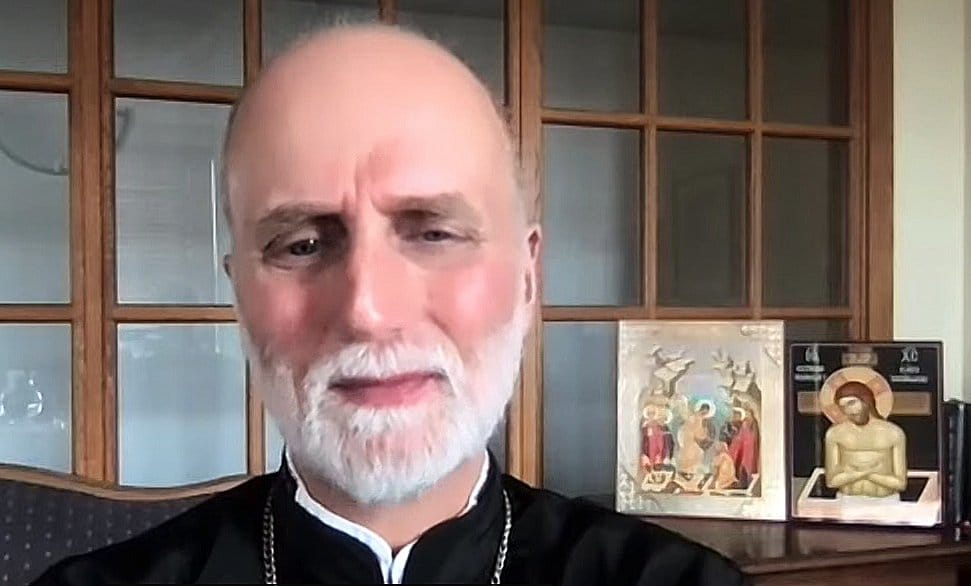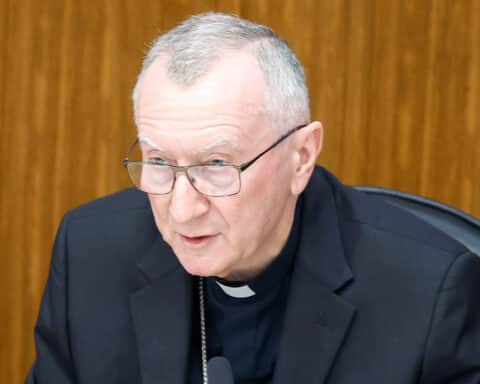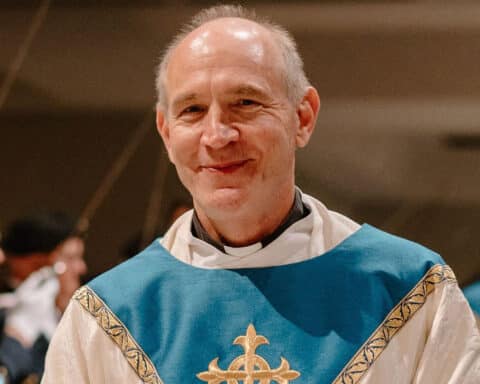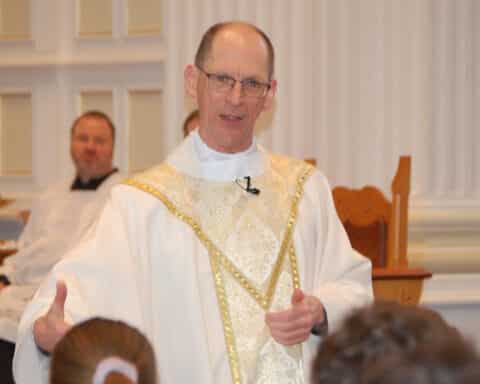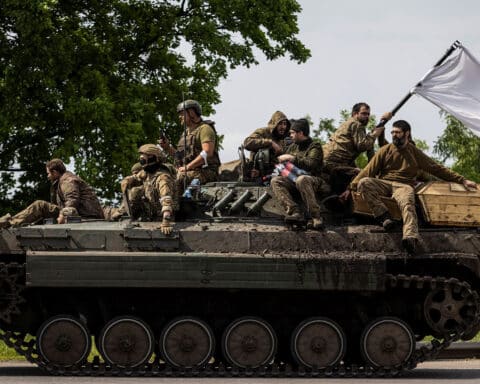The perseverance of prayer, dialogue, truth and support with Lenten resolve is a way to end the war in Ukraine and 12 other conflicts around the world, a panel of experts said Thursday during a streamed discussion sponsored by the Initiative on Catholic Social Thought and Public Life at Georgetown University.
“War in Ukraine: Human Agony, Global Crisis, Moral Principles” was the title of the virtual event.The invasion of Ukraine by Russia has driven 4 million people from their homes, killed thousands of civilians and soldiers, flattened cities and generated near nonstop media coverage of the horrors occurring in the European nation.
“The Passion and the Crucifixion, that is what is happening,” said Archbishop Borys Gudziak, metropolitan archbishop of Philadelphia for Ukrainian Catholics in the United States.
That the war is happening during Lent “is a special invitation to discover what we can do and what our leaders can do to stop the war,” said Canadian Cardinal Michael Czerny, SJ, interim prefect of the Vatican’s Dicastery for Promoting Integral Human Development, who visited Ukraine and neighboring countries recently as Pope Francis’ personal ambassador.
The discussion was led by John Carr, executive director of the Georgetown initiative. The other participants were Laurie Johnston, an associate professor of theology and religious studies at Emmanuel College in Boston and the executive vice president of the Sant’Egidio Foundation for Peace and Dialogue; Gerard O’Connell, the Vatican correspondent for America magazine, who has reported extensively on Pope Francis’ response to the invasion of Ukraine; and Tetiana Stawnychy, president of Caritas Ukraine.
“The most important thing now is to stop the war … to take on board the idea that there is no such thing as a local war … this is a proxy war,” Cardinal Czerny said.
“It is a David and Goliath war,” Archbishop Gudziak added. He contended that the “Ukrainian story has been secondary” to the military conflicts in its history. “Ukrainians are saying, ‘We are made in God’s image and likeness.'”
O’Connell, who has covered the Vatican since 1985, and who has traveled to Ukraine on assignment — once with Pope St. John Paul II on a papal visit — said he is struck “by the brutality of this war, the targeting of civilians, hospitals, schools and churches … the inability of any country or power that cannot stop the war. And stopping the war is in the power of one man: [Russian President Vladimir] Putin.”
O’Connell’s wife, Elisabetta Piqué, is a correspondent for Argentina’s major newspaper, La Nacion, and she is in Ukraine covering the war “that has thrown in the dustbin” the post-World War II structure of international relations and the creation of the United Nations, O’Connell said.
“The first victim of war is the truth. Pope Benedict XVI spoke of the Kremlin and a ‘parade of lies,” O’Connell said. “The Russian people are not hearing the truth [a reported 70% of Russians support the war] so they don’t know how to respond.” He added: “Pope Francis is suffering from this war. He is in constant contact with the people of Ukraine. He visited the Russian Embassy to ask for a ceasefire. He has met Putin and [President Volodymyr] Zelenskyy. He hasn’t called out Putin and Russia because he wants to find a way to stop the war.”
Tetiana Stawnychy, the president of Caritas Ukraine and an American, decided to stay in Lviv despite President Joe Biden advising all U.S. citizens to leave the country last fall prior to the invasion. Carr was asked why she stayed in the war zone.
“The Caritas mission is needed right now; I never thought to leave,” said Stawnychy, whose parents immigrated from Ukraine to the United States. “Ukraine is very much in my heart and in my life. It almost felt like a vocation … and it didn’t happen overnight. … It developed over the years by seeing what they have endured. They inspire me.”
Laurie Johnston, from Emmanuel College in Boston, asserted that the values of the Catholic faith can cause an uncomfortable juxtaposition of feelings in a war.
“These are moral choices we make that go back to our Catholic faith,” Johnston said. “Our commandment is to love your neighbor as yourself and to love your enemies. The Ukrainians are suffering, and it is our duty to love them, and we help them, but we are also commanded to love our enemies. Our duty to love our enemies can transform them into a neighbor.”
Carr asked the group, “What is at stake for the Church and the people of Ukraine?
Archbishop Gudziak said: “God’s plan is the approach we take. Jesus is everywhere, and the fullness of the Church is wherever his Church is. What is at stake is the ability to practice their faith. This is the struggle to finally name, analyze and condemn one of the great murderist systems: authoritarianism.”
Cardinal Czerny asserted that Pope Francis contends there are 12 other ongoing wars in the world, notably the Yemen civil war, which has been ongoing since 2014 and been the cause of 140,000 recorded fatalities.
Stawnychy continues to place her faith in humanity despite the inhumanity of the war in Ukraine.
“I have a sense that everyone is echoing in their hearts the needs and suffering of Ukrainians,” she said. “Listen to what your heart says. The volunteers in Poland … and what they are doing was not planned from above. It is in the subsidiarity … more human, more in the image of God, good is spreading.”
Archbishop Gudziak likens the response to the needs of Ukrainians to “the Lenten pilgrimage. God is guiding us, but we can’t be guided unless we are praying for guidance.”
Joseph R. LaPlante writes from Rhode Island.

